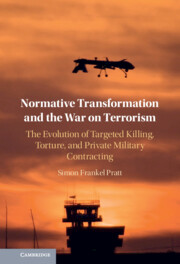
-
Select format
-
- Publisher:
- Cambridge University Press
- Publication date:
- January 2022
- January 2022
- ISBN:
- 9781009092326
- 9781316515174
- 9781009096461
- Dimensions:
- (229 x 152 mm)
- Weight & Pages:
- 0.48kg, 228 Pages
- Dimensions:
- (229 x 152 mm)
- Weight & Pages:
- 0.338kg, 228 Pages
You may already have access via personal or institutional login
Book description
Pratt investigates the potential erosion of prohibiting assassination, torture, and mercenarism during the US's War on Terrorism. In examining the emergence and history of the US's targeted killing programme, detention and interrogation programme, and employment of armed contractors in warzones, he proposes that a 'normative transformation' has occurred, which has changed the meaning and content of these prohibitions, even though they still exist. Drawing on pragmatist philosophy, practice theory, and relational sociology, this book develops a new theory of normativity and institutional change, and offers new data about the decisions and activities of security practitioners. It is both a critical and constructive addition to the current literature on norm change, and addresses enduring debates about the role of culture and ethical judgement in the use of force. It will appeal to students and scholars of foreign and defence policy, international relations theory, international security, social theory, and American politics.
Reviews
‘All in all, Pratt’s book offers a compelling process-based and relational account of normative change. It constitutes an outstanding contribution to what David McCourt calls the ‘new constructivism’ and it is a must-read for IR scholars and students interested in normativity.’
Lucrecia García Iommi Source: International Affairs
Contents
Metrics
Altmetric attention score
Full text views
Full text views help Loading metrics...
Loading metrics...
* Views captured on Cambridge Core between #date#. This data will be updated every 24 hours.
Usage data cannot currently be displayed.
Accessibility standard: Unknown
Why this information is here
This section outlines the accessibility features of this content - including support for screen readers, full keyboard navigation and high-contrast display options. This may not be relevant for you.
Accessibility Information
Accessibility compliance for the PDF of this book is currently unknown and may be updated in the future.


